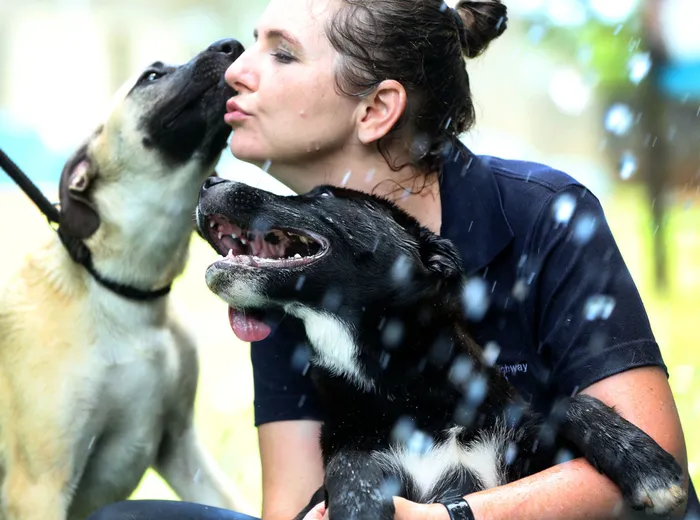If you are hot, pets are hot too

Kloof and Highway SPCA inspector and marketing manager Brigitte Ferguson cools down with Willow, left, who needs a home, and Tug who has recently found a home, on a stifling summer day. Picture: Shelley Kjonstad African News Agency (ANA)
Durban - If you are feeling the heat, your pet is too.
Busy local SPCAs, which are always raising funds to help them step in when an animal is in need, say helpless animals rely on humans who care.
Even though a few cooler days will offer brief relief over the long, blistering heat of summer, SPCAs say one of the ways people can help is to make sure pets are well-cared for when temperatures are high.
Kloof and Highway SPCA operations manager Sarah van Heerden and inspector and marketing manager Brigitte Ferguson said they had been busy during December, and New Year “had been bad”.
Van Heerden said that in December they had taken in 904 animals of which 489 were unwanted, 310 were strays, and 63 were euthanised at the request of the owners.
She said the animals had come from Westville, Pinetown, Everton, New Germany, Waterfall, Kloof and Hillcrest.
“The New Year was bad. The number of animals admitted because of fireworks and strays was high. We had 33 animals come in on top of the 122 in our care already.”
“Take ownership and responsibility. Do not take an animal if you are not ready for a lifetime with it as a part of your family. You have to consider the training, food costs, health annual check-ups, and treatment.
“Our goal is to be an outreach for sterilisation, and prevent cruelty. It is unfair for someone who can afford pet health to use the facility when someone else who is not close to a facility and needs assistance does not get help,” Van Heerden said.
As summer temperatures peak, pet owners need to ensure their pets are kept cool.
“Try to walk the dogs really early in the morning or later in the evenings when the temperatures are cooler. Do not over-exercise them.
“Make sure you keep them in a shelter without a tin roof or wood because they retain heat. Rather just have a roof shelter only,” Van Heerden said
She said dogs bred for colder climes, such as huskies and malamutes, and flat-faced dogs such as bulldogs, pugs and boxers battled in the heat and needed fresh air and a wet blanket on which to lie.
Ferguson gave tips on how to recognise an animal suffering from heat stroke.
“Firstly you will notice increased panting or lethargy. Give them water and take them to your nearest vet.
“Another fun way to keep animals cool would be to fill up a 2-litre ice cream container overnight and give it to your dog to play with and lick,” she said.
Van Heerden and Ferguson said their team planned to raise funds for renovations.
Van Heerden said: “Our clinic needs a revamp to allow more room for the growing number of patients we see. We also need an X-ray machine and a fully functioning laboratory, and the cost will be R1.2 million. We have growing costs of fuel to keep our inspectors on the road, and a revamping of our kennels, especially with roofing. The roof is almost 20 years old and we need more shade, especially when it is hot. That is why we need more shelter.”
Durban and Coastal SPCA’s marketing manager Tanya Fleischer had these tips for protecting pets against heat stroke
• Never leave your dog (or your children) alone in a parked car. Even in fairly moderate weather, and with windows left slightly open, the temperature in a car can rise surprisingly quickly.
• If you are taking your dog on a car trip, stop regularly to give water and also make stops for the dog to relieve itself. Make sure the dog is on a leash when you let it out of the car.
• At home, ensure there is always shade for your animals and bowls of water are in shady places. Have more than one bowl of water in case one gets knocked over or is lapped up quickly.
• Don’t leave your dog shut up in a garage or shed.
• Don’t walk your dog on hot cement, sand or tar.
• Prevent sunburn to dogs with white coats and white, non-pigmented skin. (One can buy animal sunscreen for dogs with pink skin.)
• The SPCA sometimes has cases of dogs chained and left unprotected in blazing sun without water or other sustenance. This amounts to brutal cruelty and is a criminal act. Heartbreakingly, we have discovered skeletal dogs left dead after weeks in this plight.
• Small pets like birds, guinea pigs, mice and rats, and rabbits are often confined permanently to cages (which is not acceptable) and are not able to move to a shady place. If your pet spends any time at all in a cage, make sure the cage is moved to a cool, well-ventilated area during hot weather and that cool water is always available.
Signs of heat stroke:
• Signs of dizziness and confusion
• High body temperature, lethargy and restlessness
• Diarrhoea
• Racing heart
• Vomiting and heavy panting
• Heavy drooling
If you are aware of a dog being kept on a chain, please notify us by calling 031 579 6501. You may remain anonymous. Don’t make yourself complicit by remaining silent.
The Independent on Saturday
Related Topics: